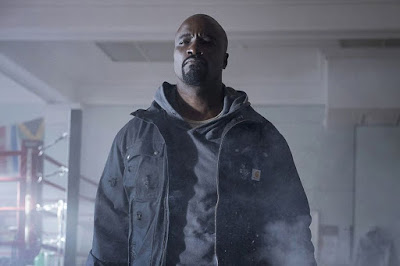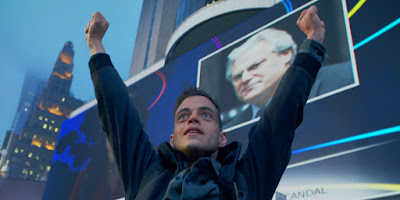TV Review: Marvel's Luke Cage - Season 1
Tossing in another dynamic player into their mix of comic-book heroes and gritty human themes, this month Netflix debuted one of their most stylized and socially-conscious series yet with Marvel's Luke Cage. Offering up another street-level hero with his own cultured past to dive into, the latest collaboration between Netflix and Marvel Studios successfully churned out a fantastic first season that displayed not only the true human nature of hero-for-hire Power Man aka Luke Cage, but also the riveting and pioneering society around him.
Introducing fans to another emotionally-scarred and hard-hitting hero-of-sorts in the massive realm of the Marvel Cinematic Universe, Netflix's latest dive into the superhero genre -- following their brilliant iterations of the blind vigilante Daredevil and the radical private investigator Jessica Jones -- finds them in the gritty streets of today's Harlem. Jumping into a whole new realm of style, storytelling, and action, all while retaining its comic-book basis, the streaming service's daring take on the hero-for-hire of Harlem, Luke Cage, managed to once again bring a unique sense of style to the MCU. With a phenomenal cast of African-American actors, a fantastically-crafted and highly distinctive hip-hop soundtrack, and a leading man of indestructible force, Marvel's Luke Cage effectively expanded the ever-growing MCU into even darker and more human places.
While Daredevil may have brought us a hero broken and forever crippled by his childhood, and Jessica Jones may have delivered a tough-skinned crook-turned-P.I. just looking for revenge, Marvel's Luke Cage offered up a man tormented not so much physically, but psychologically by his wronged past. An ex-cop falsely imprisoned and built up on the belief that no one is to be trusted, we find Luke Cage torn from his home and made a monster, only to return to a broken city of corruption. One of the most compelling elements of Luke Cage had to be the character's pure humanity, and ultimately, his internal retribution. Managing to stand apart from its Marvel-Netflix counterparts, Luke Cage dove into the mentality of a man who never saw himself as a hero, but simply a man trying to live a life of normality. Entering into a world of violent gang wars and venomous politicians, the hero-of-sorts that evolves from Luke Cage was a riveting story to tell.
Along with that central story of internal retribution, Luke Cage also prospered because of its distinctive setting. Set in modern-day Harlem, a realm of New York City consumed in corruption, racism, and politics, the series managed to take all those issues and spin them on their head. Using the ideal of a bulletproof black man to flourish the concept of the "Black Lives Matter" movement and the inherent racism against minorities that still exists in our society, Luke Cage managed to utilize its gritty and imperfect setting to deliver a socially-aware and approachable series. Along with that, the show's setting of Harlem also brought a memorable of elegance and variety to the show's look and feel. Bolstered by chilling soul and jazz music, infused superbly with dynamic hip-hop and rap stylings, Luke Cage could have easily stood out by its unique music alone.
As for the series' cast, the variety and elegance never faded as every member of the cast brought something unique to their roles. From Mike Colter's cold but charismatic protagonist in the bulletproof hero-for-hire to Mahershala Ali's snake-like villain in Cornell "Cottonmouth" Stokes, the dedication to each character in Luke Cage was clearly evident, especially as the series pushed on. With Luke Cage and Cottonmouth's brutal feud over Harlem taking shape similar to that of Daredevil and Wilson Fisk in Daredevil and Jessica Jones and Kilgrave in Jessica Jones, the psychological battle between the two also flourished because of their respective pasts. One of the most compelling aspects of the season was not only Luke Cage's rise and fall from a respected man of authority to a failed lab experiment, but also Cottonmouth's enthralling story of how he manifested into a morally-flawed "Godfather-type villain". Delivering two fascinating performances dripping in tragedy and regret, Colter and Ali lead the show with their intertwined struggle of walking the line between good and evil.
The supporting players in the season also never failed to deliver effective and emotional performances. Intermingling their respective character's backgrounds and motivations with considerations of how these characters would act in a modern landscape, the supporting actors of Luke Cage brought a fluent attitude and distinct badassery to their characters. While the talented Alfre Woodard tossed in a maniacal wild card as the morally-ambiguous Harlem politician Mariah Dillard, and the Daredevil regular Rosario Dawson provided a nice sexual tension between her and Colter's Cage as nurse Claire Temple, two of the most memorable supporting roles had to be Simone Missick's radical cop Misty Knight and Theo Rossi's relentless gangster Shades. Two characters I never got bored of seeing on-screen, the intense performances of both Missick and Rossi offered a fantastic parallel to Colter's silent but effective take on Luke Cage.
Along with that central story of internal retribution, Luke Cage also prospered because of its distinctive setting. Set in modern-day Harlem, a realm of New York City consumed in corruption, racism, and politics, the series managed to take all those issues and spin them on their head. Using the ideal of a bulletproof black man to flourish the concept of the "Black Lives Matter" movement and the inherent racism against minorities that still exists in our society, Luke Cage managed to utilize its gritty and imperfect setting to deliver a socially-aware and approachable series. Along with that, the show's setting of Harlem also brought a memorable of elegance and variety to the show's look and feel. Bolstered by chilling soul and jazz music, infused superbly with dynamic hip-hop and rap stylings, Luke Cage could have easily stood out by its unique music alone.
As for the series' cast, the variety and elegance never faded as every member of the cast brought something unique to their roles. From Mike Colter's cold but charismatic protagonist in the bulletproof hero-for-hire to Mahershala Ali's snake-like villain in Cornell "Cottonmouth" Stokes, the dedication to each character in Luke Cage was clearly evident, especially as the series pushed on. With Luke Cage and Cottonmouth's brutal feud over Harlem taking shape similar to that of Daredevil and Wilson Fisk in Daredevil and Jessica Jones and Kilgrave in Jessica Jones, the psychological battle between the two also flourished because of their respective pasts. One of the most compelling aspects of the season was not only Luke Cage's rise and fall from a respected man of authority to a failed lab experiment, but also Cottonmouth's enthralling story of how he manifested into a morally-flawed "Godfather-type villain". Delivering two fascinating performances dripping in tragedy and regret, Colter and Ali lead the show with their intertwined struggle of walking the line between good and evil.
The supporting players in the season also never failed to deliver effective and emotional performances. Intermingling their respective character's backgrounds and motivations with considerations of how these characters would act in a modern landscape, the supporting actors of Luke Cage brought a fluent attitude and distinct badassery to their characters. While the talented Alfre Woodard tossed in a maniacal wild card as the morally-ambiguous Harlem politician Mariah Dillard, and the Daredevil regular Rosario Dawson provided a nice sexual tension between her and Colter's Cage as nurse Claire Temple, two of the most memorable supporting roles had to be Simone Missick's radical cop Misty Knight and Theo Rossi's relentless gangster Shades. Two characters I never got bored of seeing on-screen, the intense performances of both Missick and Rossi offered a fantastic parallel to Colter's silent but effective take on Luke Cage.
Overall, while the show's writing and direction may not stand above some other Netflix series out there today, Luke Cage still managed to deliver one of the most realistic and human superhero shows on TV. Socially relevant and boosted by its swaggering hip-hop style, Luke Cage delivered an entertaining season that was never afraid to take the issues of both today and the past, and twist them just the right way. Through 1970s era themes and music and effective character development, Luke Cage showed once more that Netflix is the prime place for fantastic superhero stories.
I gave Season 1 of Marvel's Luke Cage a 7 out of 10 for its brilliant '70s style, its riveting tale of power and culture, and its social and political awareness to some of today's most profound issues. If you're a fan of Luke Cage and you're not watching this show already, sweet Christmas, you need a wake-up call...







Comments
Post a Comment